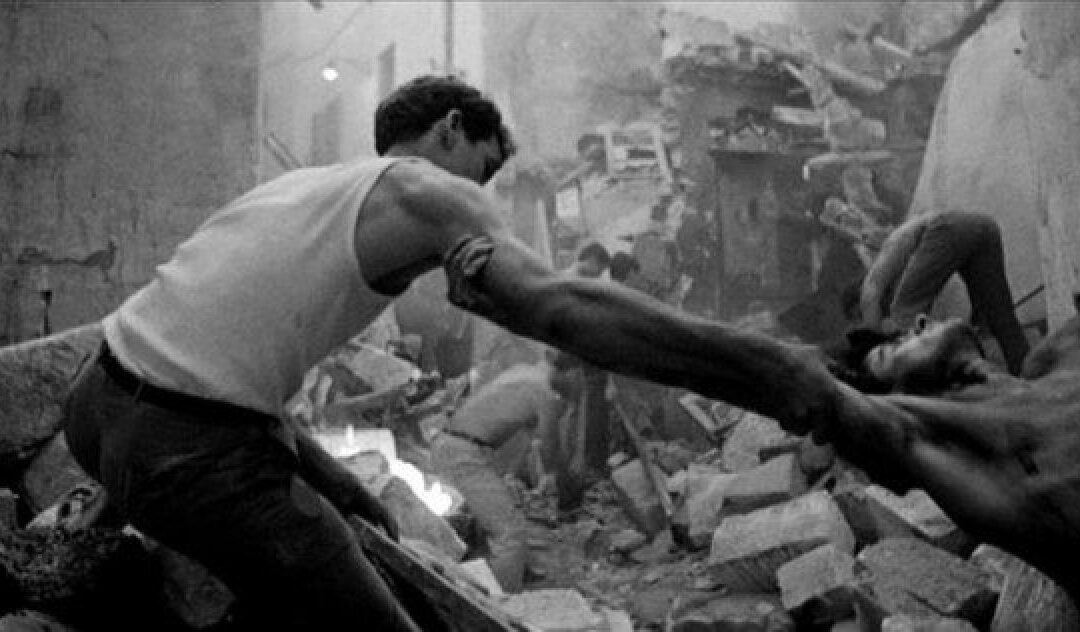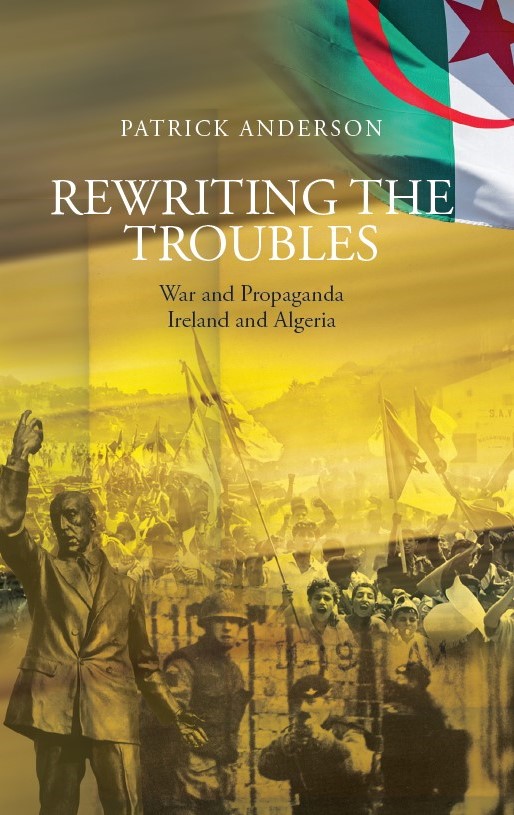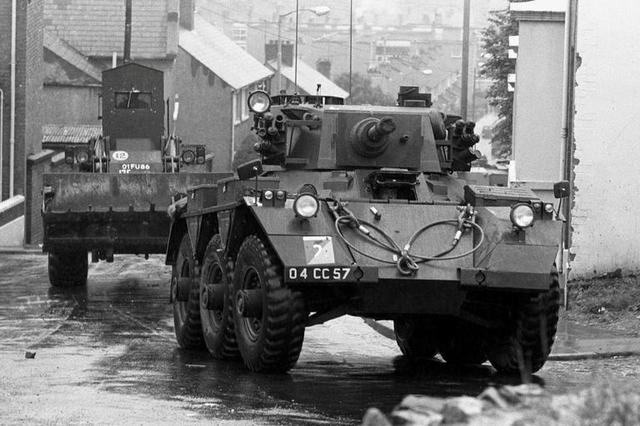Sam Thompson writes and occasionally lectures on history. A former RUC officer, he wrote his first novel, Nights in Armour, under a nom de plume, which I reviewed back in 2017. An updated version of the novel was published by Mercier Press in 2019. Sam now describes himself as a ‘former unionist’ since Brexit and is agnostic on the constitutional issue. Here he reviews Patrick Anderson’s book, Rewriting The Troubles.
-oo0oo-
WHEN I was a child, I had no idea if my family was wealthy or poor. Children tend to accept the situation they become aware of as being the norm. We had an indoor toilet and bath, unlike my grandparents, so I assumed we must be fairly well-off. That was until some of my more middle-class friends invited me to their houses. It was then I realised my family was not quite as affluent as I had imagined. I’m not undertaking a nostalgic trip down memory lane here but rather pointing out that we need comparisons to accurately assess our own situation, and just as importantly, to provide context. Most history students will have studied comparative history and Patrick Anderson’s recent work, Rewriting the Troubles: War and Propaganda in Ireland and Algeria* is a rare and welcome case of a study that compares our own conflict to another.
The title is topical but somewhat misleading as history is constantly being rewritten as new information comes to light, but it makes sense as Anderson constantly challenges old accepted ‘facts’, particularly those emanating from government sources and the media. The book is well researched and comprehensively referenced but despite its academic style is an engaging and easy read. It is a classic ‘compare and contrast’ type of work between two conflicts that superficially have much in common. The Algerian conflict is separated from our own by less than a decade and both involved declining colonial powers facing a counter insurgency that sought to drive them out of territory they regarded as an integral part of their state rather than an overseas colony, even if that was the origins of both.
There were loyalist populations in both Algeria and Northern Ireland fighting, officially and unofficially, to retain the status quo, and Britain and France were established democracies with a free press. Both used a level of military force that broke the legal framework state forces were officially operating in.
There is no shortage of detail from Anderson whose stance in my view, is broadly but not uncritically pro-IRA. The main focus of his fire however is not the British state but the press, or to be more exact, the editors and journalists of The Guardian that criticised excessive French violence but meekly followed the Ministry of Defence or Northern Ireland Office line with regard to Ireland. Anderson’s case is that the French were more restrained than is commonly supposed and the British far less so and he brings forth much evidence to support his case even if the same evidence also occasionally undermines it.
In places though, Anderson’s phrasing is a little careless which may mislead the reader. For example, in a chronology of events, ‘30,000 troops retake Free Derry’ in Operation Motorman, this changes to 27,000 on page 86 where he describes the events. The differing numbers are not crucial but these troops levels marked the high-water mark of the British deployment and would have included the Ulster Defence Regiment. Not all of these troops could possibly have been involved in Operation Motorman as there was plenty going on elsewhere at the time. Similarly, Anderson asserts the British commitment in Northern Ireland was much higher than France’s in Algeria, by comparing the number of British troops to the local population. In this argument, a mere page before he covers Motorman, the ‘British deployment on Ireland’ is 35,000. If this includes the RUC, why doesn’t he say so? Precision often makes language awkward but in history it is essential, though admittedly often difficult. Anderson argues that if the 35,000 was calculated on a pro-rata basis it would equate to 600,000 British troops in Northern Ireland compared to 450,000 French troops in Algeria. He compares Northern Ireland to Algeria but not Britain to France whose populations were very similar. France actually devoted twelve times more troops to Algeria than Britain did here, a figure that doesn’t count French national police units which unlike the RUC, would have been recruited mostly in the ‘homeland’, in this case, metropolitan France. In short, the French commitment in Algerian in terms of manpower was far greater than the British one in Ireland and not too far off American troop levels in Vietnam, a huge commitment by any standard.
Anderson, rightly, given the direction of his argument, focuses on the similarities of the two conflicts and Irish readers who can remember the 1960s and 1970s will find many things in Algeria to remind them of home.
In my view, he could perhaps have spent a little more time on the differences. In terms of population Algeria was around 7-8 times that of Northern Ireland and the estimated dead of 250 – 300,000 is staggering, even when the different population sizes are considered. The level of violence Anderson details also went way beyond anything experienced here. A bout of violence in May 1945, which preceded the war of independence, saw 103 Europeans massacred and mutilated after French forces shot a protestor dead. The French in turn killed 1,500 Muslims (official figure) or 15,000-45,000 according to local estimates. Once the war actually took off in 1954, massacres regularly ran into three figures.
The Algerian war meant so much to the French army because it was still smarting from its humiliations of 1940 and Vietnam, which made it determined to win. The British army had no great emotional investment in Northern Ireland that I could discern and I knew and spoke to many soldiers. Nor can I imagine a scenario where sections of the British army would launch a coup d’état in the event of withdrawal. De Gaulle, it should be remembered, had to briefly seek refuge in a French military base in Germany during a coup attempt. Furthermore, Northern Ireland was not a divisive issue in British politics. The two main parties usually took similar lines.
In marking the differences, Anderson rightly points out the Islamic ‘Holy War’ aspect of the Algerian conflict. Religious labels were a convenient way of identifying sides in our conflict but people killed and were killed, over perceived national loyalty rather than whether they went to mass or believed in transubstantiation. Driving the PUL (Protestant/Unionist/Loyalist) community into the sea was not IRA policy (something I’m sure some Unionists will dispute) whereas in Algeria, ‘la valise or cerceuil’ (suitcase or coffin) was a rallying cry for the anti-French FLN. I couldn’t help thinking at time that in many ways, a better comparsion might have been the 1919-21 conflict in Ireland, but read the book and make your own judgement.
I have perhaps concentrated too much on some minor criticisms and the emphasis of the book. To be fair to the author, Rewriting History is a very good comparative work and one which helps us to understand our own past better. I can recommend it with the caveat I would apply to all histories, it should not be read with an uncritical eye. It is very enlightening and its structure forces the reader to make the comparisons between the two conflicts.
The main thing I took from it was that although our own past was undoubtedly terrible, it could have been immeasurably worse.
*Rewriting The Troubles by Patrick Anderson is published by Greenisland Press and retails at £18 / €22 and is available and is available from An Fhuiseog, Belfast, and the Sinn Féin Online Shop, Dublin




